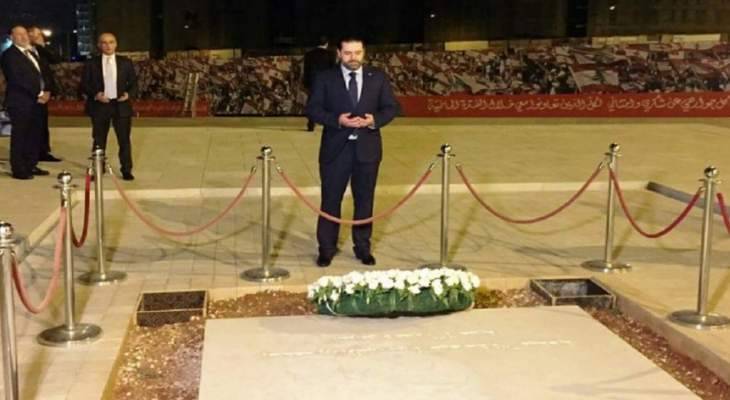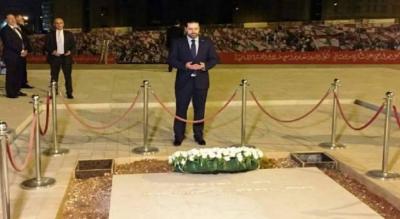It is the week of February 14 and the commemoration of the 19th anniversary of the assassination of President Rafik Hariri on February 14, 2005, when his convoy was bombed with a ton and a half of explosives by a cell from "Hezbollah," one of whose members was convicted by the Special Tribunal for Lebanon. Around 8 PM yesterday, President Saad Hariri arrived at Beit al-Wasat in Beirut to participate in the memorial for the martyr President Rafik Hariri and his companions next Wednesday. Hariri's arrival marked the beginning of an extraordinary week as the countdown to his participation began yesterday. His return, to lead the participants in the commemoration of his father, represents a more than usual event this year due to the extensive preparations launched by the "Future Movement" and its supporters, implemented throughout Lebanese regions to gather a large crowd at the tomb of President Hariri and his companions in downtown Beirut on Wednesday.
The gathering transcends the anniversary itself, calling on the leader of the movement, President Saad Hariri, to end the decision to suspend political activity he made two years ago. This week, at least in the three days leading up to the anniversary, is expected to be dominated by the Hariri event and the anticipation of what will emerge from Saad Hariri's return, which has been preceded by a huge amount of estimates, expectations, and interpretations. Objectively speaking, all this remains dependent on the decision that only Hariri possesses regarding whether he intends to announce something.
According to "An-Nahar," the number of reviews and calls from politicians to schedule appointments with President Hariri has itself formed a significant indicator regarding the political and popular circumstances surrounding his return this year, suggesting that the February 14 event will send internal and external messages in all directions, attesting to a near-consensus on Hariri’s return to national and political life through wide-ranging doors, as stated in "An-Nahar."
On another front, tensions remain high in the active southern front, with the recent dangerous escalation raising significant concerns. Just two days after the first assassination attempt via an Israeli drone in the heart of Nabatiyeh city since the July 2006 war, Saturday recorded the first similar assassination aiming by Israel in the town of Jadra in the Shouf coastal region. Thus, the Israeli war messages have expanded beyond the realm of field confrontations. Hezbollah has announced for the first time the firing of heavy rocket barrages toward Israeli positions in the occupied Golan Heights, while Israel has retaliated in Nabatiyeh and Jadra.
This escalating reality has raised numerous questions regarding the oddity that allowed Iranian Foreign Minister Hossein Amir-Abdollahian to repeat in Beirut his preference for a political solution in Gaza, while also provoking the overwhelming majority of Lebanese by positioning himself as a spokesperson for Tehran and Beirut, even while talking about the two countries' wish to prevent the war from expanding. Amidst Israeli airstrikes deep in Lebanese territory, Lebanon seems caught in the jaws of a vice that could deepen its exploitation as a regional platform, whether through Israeli war escalation or Iranian maneuvering, hinting at negotiations with the US or threats against Netanyahu from Beirut.
Amid airstrikes and military threats, international and local criticism has risen against Prime Minister Najib Mikati following the cabinet's appointment of General Hossam Aouda as new army chief, which several Christian parties deemed unconstitutional. In his sermon yesterday at the Karantina government hospital on World Patient Day, Maronite Patriarch Bechara Al-Rahi reiterated his criticisms of constitutional violations, stating, "Enough with the lethal constitutional violations in favor of individual, factional, party, sectarian, or political interests, all of which are condemned and rejected. Start first by electing a president of the state to organize all institutions."
As the campaign intensified against Mikati, the government's media office responded, indicating that several politicians and journalists have launched an attack on the decision while accusing the Prime Minister and the government of usurping the president's powers and undermining the Taif Agreement. The statement denied any consultation between Mikati and the President of the State Council regarding the appointment issue.
Despite the lack of consensus, the statement emphasized a commitment to the principles of the Taif Agreement and its associated powers while indicating readiness to comply with any judicial decisions that may result from this issue if a challenge is presented.




